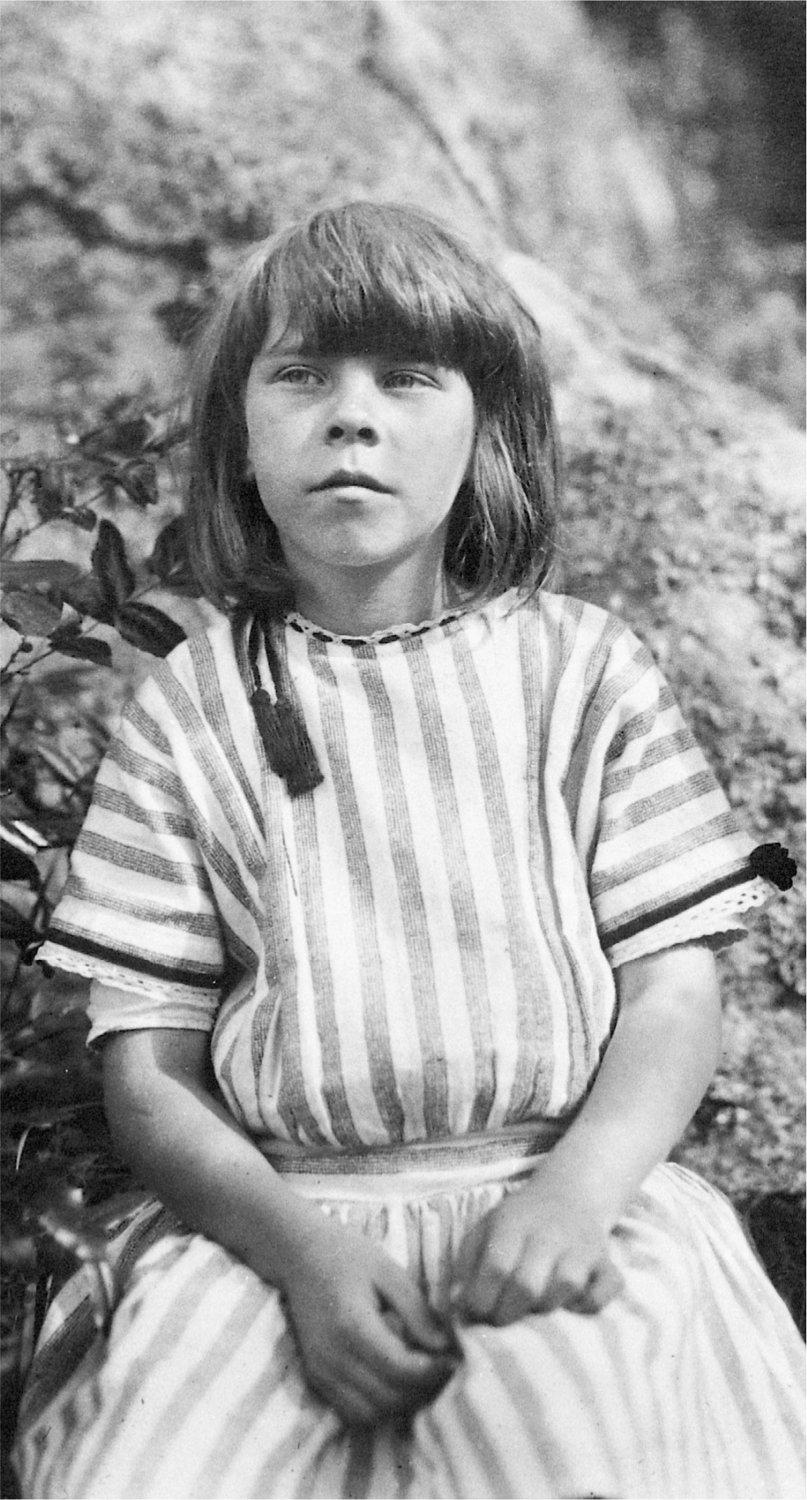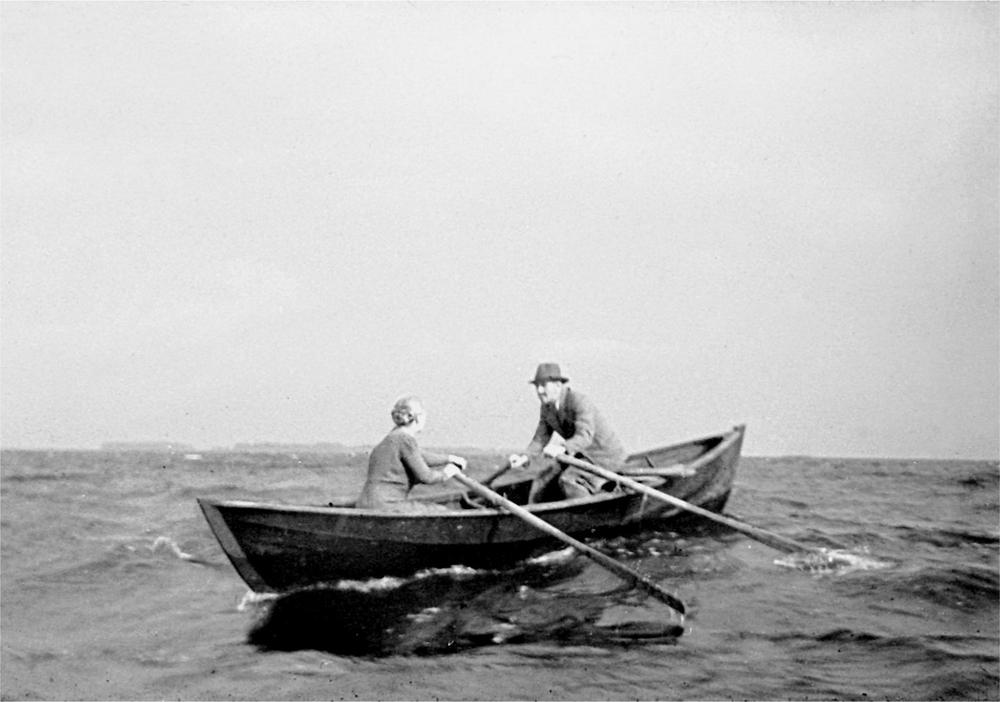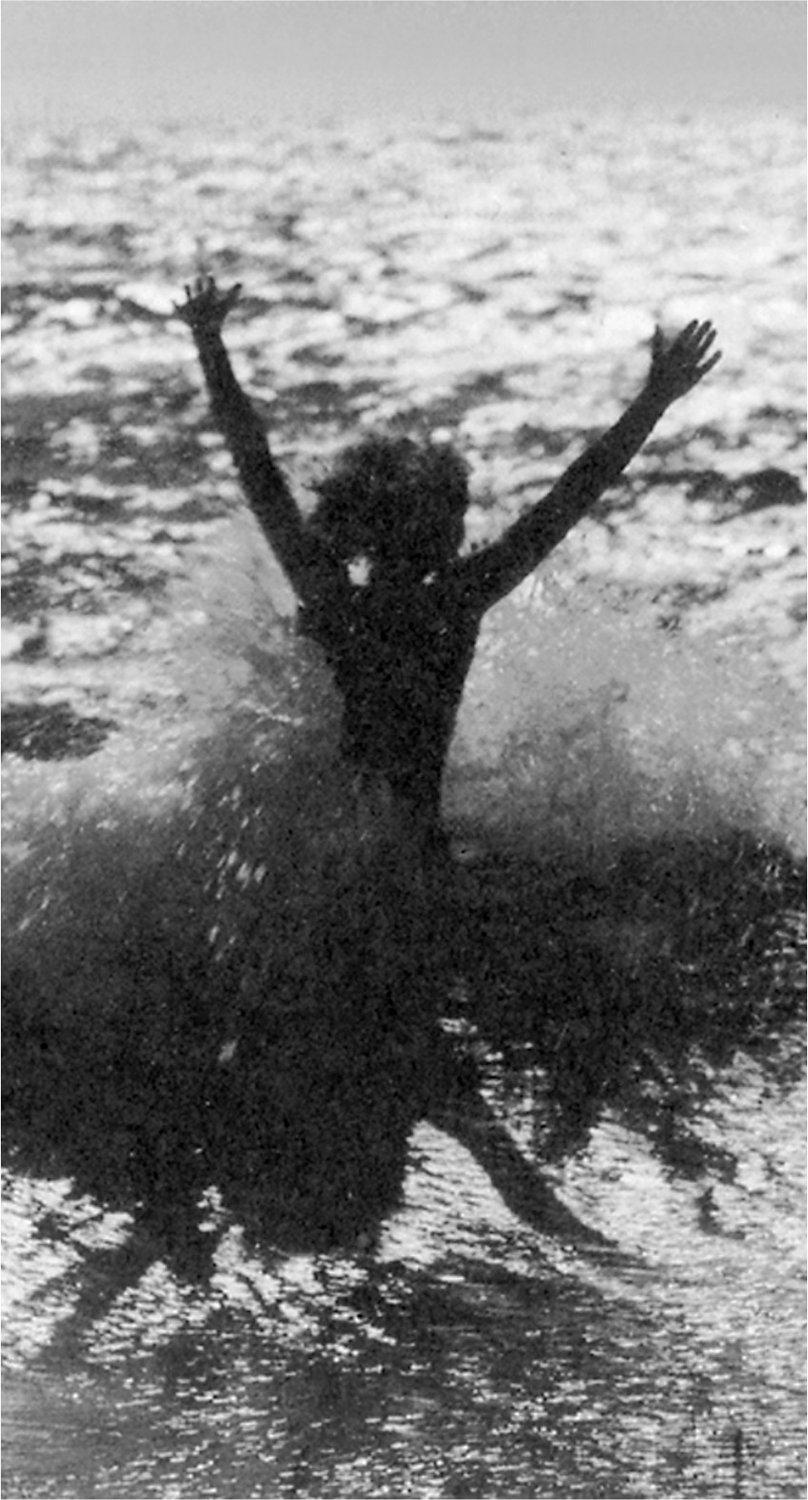Sculptor's Daughter (7 page)
Read Sculptor's Daughter Online
Authors: Tove Jansson

A
LBERT IS ONE YEAR OLDER
than I am, if you don't count six days.
For six days we are the same age.
He sat in the bay where the boats were and baited his father's long-line with bleak fish.
You must kill them first, I said. It's awful putting a hook in them while they're still alive.
Albert raised a shoulder slightly and I knew that it meant some kind of excuse and explanation: fish bite better if the bait is alive. He was wearing very faded overalls and a black cap that made his ears stick out.
How would you like to have a hook put through your back, I said. You'd be caught and you'd scream and try to get free and you'd just wait to be eaten up! What?
They don't scream, said Albert. It's always done like this.
You're cruel! I shouted. You do awful things. I don't want to talk to you any more!
He looked up at me a little sadly under his peaked cap and said: There, there! Then he went on putting the bleak on the line.
I walked away. At the boathouse I turned round and shouted: I'm just as old as you are! I'M JUST AS OLD AS YOU ARE!
Yes, I suppose you are, Albert replied.
I went and knocked nails into the raft but it wasn't any fun. Three nails went in crooked and I couldn't get them out again.
I went down to the beach again and said: fish suffer just as much as people do.
I don't think they do, said Albert. They're a lower form of life.
I said: how can you tell? Imagine if trees suffer as well! You saw them in half and they scream although you can't hear anything. Flowers scream when you pick them, though only a little bit.
Perhaps they do, said Albert. He said it in a very kind way but, even so, a little patronisingly and that made me angry again.
It was a nasty day. It was hazy and hot and sticky. I tried to cheer myself up by going to sit on the roof and sat there for a long time. I saw Albert and Old Charlie row out with the long-line. On the horizon there was a dirty-looking bank of clouds stretching all the way from Acre Island to Black Ball and the sea was completely smooth.
Then they came back and pulled up the boat.
After a while I could hear Albert knocking nails into the raft. I climbed down the ladder and went over to him and watched.
You knock nails in well, I said.
Then he hammered even more violently so that every nail went in with five blows. I began to feel better. I sat down in the grass and watched him and counted the hammer blows out loud. One nail went in with four. Then we both laughed.
Let's take it out straight away, I said. Now. We'll find a roller and get it into the sea at once.
We dragged up two planks and put a pit-prop across them and lifted the raft on to it. It was heavy and it creaked and bent a bit, but we got it up. Then all we had to do was roll it. The raft entered the water and glided out into the bay. It sat in the water beautifully. Albert went to fetch the paddles and we waded out, gave the raft a shove and jumped on. A little water came over the top but not much. We looked at each other and laughed.
It was slow work paddling but we got going. We reached deep water, but that was all right because we had both nearly learnt to swim. After a while we entered the sound near Red Rock.
Let's go to Sandy Island, I said.
I'm not so sure about that, Albert answered. It's going to get foggy.
But I paddled on and we moved slowly towards Sandy Island. We punted ourselves along the shore and past the point. The sea was just as smooth and the bank of dirty clouds had grown and reached Egg Island. Albert pointed and said, that's fog. Now we're going home.

You aren't afraid of a little fog, are you? I asked. Let's go a little bit further and then we'll turn round.
I'm not so sure about that, said Albert.
You're not scared, are you? I said, and he paddled on and the raft went out to sea again. It was like moving across a black mirror, like standing on the sea, one could feel the faint swell all through one's body and one moved with it. The swell came from the south-east and rolled on towards Egg Island.
We're turning round now, said Albert firmly. The fog's coming.
It got cold very quickly and the fog was there, moving thickly around us, shutting us in on all sides. The smooth swell rolled out of the fog, crawled under the raft with a swallowing movement and rolled back into the fog the other side. I was freezing and was waiting for Albert to say, what did I say? Or, I told you so ⦠but he was silent and just paddled on and looked worried. He turned his head this way and that and listened and looked at the swell and kept in to the shore. After a while he kept more out to sea instead. Now there was a cross-wave in the swell and it started to come from all directions at the same time. Albert stopped paddling and said: we'd better wait until it lifts.
I was a little scared and said nothing at all.
If only Rosa would moo we'd get our direction, said Albert.
We listened in the fog but Rosa didn't moo, everything was as silent and deserted as the place where the world ends, and terribly cold.
Look, there's something floating, said Albert.
It was greyish-white and straggly and was moving very slowly in a circle towards us in the swell.
Albert said: it's a herring-gull. He poked it with the paddle and lifted it up onto the raft. It looked very big on the raft and went on shuffling round in a circle.
It's not well, I said. It's in pain.
Albert picked it up by the neck and looked at it, and it began to screech and flap one wing.
Let it go! I shouted. Everything looked so
terrifying
with the fog and the black water and the bird creeping around and screaming that I was beside myself and said: give it to me, I'll hold it in my lap, we must make it well again!
I sat down on the raft and Albert laid the bird in my lap and said: it won't get well. We must kill it.
You're always killing and killing, I said. Look how it's cuddling up to me, it's lonely and unhappy!
But Albert said it's got worms, and lifted up one wing and showed me that it was crawling with them. I screamed and threw the bird down. Then I started to cry and sat down and watched Albert pick up the bird very carefully and examine its wing.
There's nothing you can do about this, he explained. It's rotten. We'll have to kill it.
But let it fly away, I whispered. Perhaps it will get well after all.
Why should it suffer? said Albert. He took out his sheath-knife and held the bird by the head, pressing it down onto the raft. I stopped crying and watched, I just couldn't look away. Albert turned round so that he was between me and the gull. Then he cut right through its neck and let the head and the body of the gull slip into the water. When he turned round again he was as white as a sheet.
Look, there's blood! I whispered and began to tremble all over. Then he rinsed the blood away.
Don't get worked up about it, he said. You see, it was much the best way.
He was so kind that I began to cry again, and now it was lovely to be able to cry. Everything was over and everything was all right.
Albert always put things right. Whatever happened and however one behaved it was always Albert who put things right.
He stood looking at me, worried and not understanding. Don't be cross any longer, he said. Look, the fog's lifting and the wind is changing.
O
NE SUMMER THE BOATHOUSE
was empty because Old Charlie was out fishing all the time. Mummy sat on our veranda and drew illustrations and sent them to town with the herring boat. From time to time she took a dip in the sea and then she went on drawing again.
Daddy looked at her and then he went and looked in the boathouse and in the end he went to town and fetched his modelling stand and box of clay, his armatures and his modelling tools. He turned the boathouse into a studio and everybody got interested in it and helped him. They tried to tidy up all Old Charlie's tools and wanted to clean the floor, but that they weren't allowed to do.
Daddy got cross and then they understood that for Daddy the boathouse was a sacred place and not to be disturbed in any way. Nobody went down the field near the beach and the boats had to tie up at the herring jetty.
It was a very hot summer and the wind never blew.
Mummy drew and drew and every time a drawing was cleaned up with a rubber she allowed herself to take a dip. I stood next to the table on the veranda and waited till she held up a drawing so that the Indian ink could dry faster and we both laughed because we were thinking what it was like in town when drawing was done at night and made you so tired that you felt sick. Then we ran down to the beach and jumped into the sea. When Old Charlie had people from town staying with him I had to wear my knickers in the water.
Daddy was working in his new studio. He went there after he'd been fishing and had his breakfast. Daddy loves to go fishing. He gets up at four in the morning and takes his fishing rod and goes and looks at the bleak fish in the bait box.
It was so hot in the bay that the bleak all died, and we put out the net almost every evening just off Sandy Island. We put a packet of crispbread for Daddy on the veranda every morning. He filled his pockets full and rowed out through the sound.
A mooring-stone is very important. One can look for hours without finding a really good one, as they have to be slightly oval and have a notch in the middle. In the morning Daddy goes fishing by himself. Nobody interferes with him and nobody says he mustn't. The lighting is wonderful then and the rocks look just as good as if Cavvy had painted them. One just sits and looks at the float, and one knows the fish will bite and when they'll bite. There's a rock underneath the water that has been named after Daddy, it's called Jansson's rock and will be called that for ever and ever. Then one makes one's way home slowly, looking to see if there's smoke coming out of the chimney.

Nobody else likes fishing. But Mummy helps with the bag-net and sits at the helm and trails a trolling-spoon. She has no sense of where the right spots are, but that's something people are born with and it's seldom found in women.
Daddy went to his new studio after breakfast. It was just as hot every day and there was never any wind.
Daddy got more and more glum. He began to talk politics. Nobody went near the boathouse and we didn't bathe near there either but went to the first bay instead.
The worst thing was the way in which Old Charlie's visitors behaved. They went out of their way to cut Daddy off when they saw him coming and addressed him as sculptor and asked him whether he had had any inspiration or not. I have never heard anything so tactless. They crept past the boathouse in an obvious way, putting their fingers up to their lips, whispering and nodding to one another and giggling, and naturally Daddy could see the whole performance through the window.
And the worst thing was that they suggested motifs to him. Mummy and I felt so terribly embarrassed for them, but what could we do?
Daddy became more and more glum and in the end he didn't speak to anyone at all. One morning he didn't even go fishing but stayed in bed staring at the ceiling with his lips pursed.
And it got hotter and hotter.
Then all of a sudden the water began to rise. We didn't notice it until the wind got up during the night. It all happened in half an hour. A mass of dry twigs and rubbish from the yard was blown against the window-panes and the storm roared through the forest, and it was so hot that one couldn't even bear to have a sheet over one in bed. The door was burst open and we ran out onto the steps and saw that there were white horses behind Red Rock, and then we saw the water glistening right up round the well and Daddy cheered up and shouted, well, I'll be damned! What weather! and put his trousers on and was outside in a jiffy. Old Charlie's visitors had been blown out onto the slope in their nightshirts and stood there all huddled together and had no idea at all what to do. But Mummy and Daddy went down to the beach and watched the jetty floating away towards Reed Island with all the boats pushing and nudging each other as though they were alive, and the fish-cage had broken adrift and all the pit-props were floating out through the sound. It was marvellous!

The grass was under water, the sea was rising all the time, and the storm and the night made the whole landscape look quite different.
Old Charlie ran to fetch the clothesline and Fanny stood there shouting and banging a tin can and her white hair was flying in all directions. Daddy rowed out to the jetty with a line and Mummy stood on the shore holding it.
Everything lying on the slope below the house had floated out to sea and the off-shore wind was carrying it out towards the sound and the wind was getting stronger and stronger and the water was rising higher and higher. I was shouting with glee, too, as I waded up and down and felt the floating grass getting tangled round my legs. I was trying to save planks and from time to time Daddy ran past hauling logs and shouting: what do you think of this! The wind's getting stronger all the time! He flung a rope to the visitors and shouted: take hold of this, damn you! We must get the jetty up into the field! Do something! Don't just stand there!
And the visitors hauled on the rope and were soaked to the skin in their nightshirts and had no idea what fun the whole thing was, which served them right.
In the end we saved everything that could be saved and Mummy went into the house to make tea. I pulled off my clothes and was wrapped in a blanket and sat and watched Mummy lighting the
fire. The window-panes rattled and were quite dark and it started to rain.
Then Daddy burst in and went into the kitchen and shouted: Damn it! Can you imagine what's happened! The water has risen nearly two feet in the boathouse! The clay looks like porridge. It's a damned nuisance, but there's nothing to be done about it!
How terrible, said Mummy, looking just as pleased as Daddy.
I've been down to the first bay, Daddy said, and it's blowing hard down there and a whole load of logs is floating in. I've no time for tea now. I'll be back later.
All right, said Mummy. I'll keep it warm.
Then Daddy went out again. Mummy poured out tea for us all. It was the best storm we had ever had.